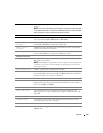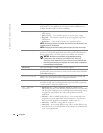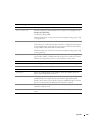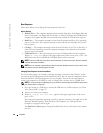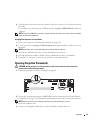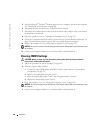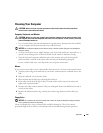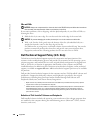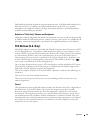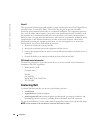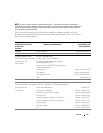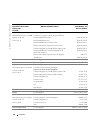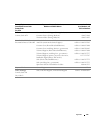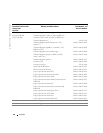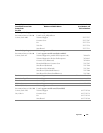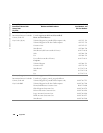
Appendix 141
Dell-installed peripherals include any internal expansion cards, or Dell-branded module bay or
PC Card accessories. In addition, any Dell-branded monitors, keyboards, mice, speakers,
microphones for telephonic modems, docking stations/port replicators, networking products,
and all associated cabling are included.
Definition of "Third-Party" Software and Peripherals
Third-party software and peripherals include any peripheral, accessory, or software program sold
by Dell not under the Dell brand (printers, scanners, cameras, games, and so on). Support for all
third-party software and peripherals is provided by the original manufacturer of the product.
FCC Notices (U.S. Only)
Most Dell computer systems are classified by the Federal Communications Commission (FCC)
as Class B digital devices. To determine which classification applies to your computer system,
examine all FCC registration labels located on the bottom, side, or back panel of your computer,
on card-mounting brackets, and on the cards themselves. If any one of the labels carries a
Class A rating, your entire system is considered to be a Class A digital device. If all labels carry
an FCC Class B rating as distinguished by either an FCC ID number or the FCC logo, ( ),
your system is considered to be a Class B digital device.
Once you have determined your system’s FCC classification, read the appropriate FCC notice.
Note that FCC regulations provide that changes or modifications not expressly approved by
Dell could void your authority to operate this equipment.
This device complies with Part 15 of the FCC Rules. Operation is subject to the following two
conditions:
This device may not cause harmful interference.
This device must accept any interference received, including interference that may cause
undesired operation.
Class A
This equipment has been tested and found to comply with the limits for a Class A digital device
pursuant to Part 15 of the FCC Rules. These limits are designed to provide reasonable
protection against harmful interference when the equipment is operated in a commercial
environment. This equipment generates, uses, and can radiate radio frequency energy and, if
not installed and used in accordance with the manufacturer’s instruction manual, may cause
harmful interference with radio communications. Operation of this equipment in a residential
area is likely to cause harmful interference, in which case you will be required to correct the
interference at your own expense.



